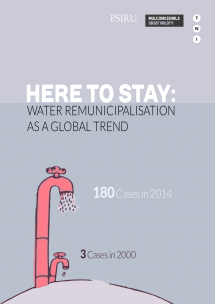Festgestellt: Globaler Trend der Rekommunalisierung des Wassers
In the last 15 years there have been at least 180 cases of water remunicipalisation in 35 countries, both in the global North and South, including high profile cases in Europe, the Americas, Asia and Africa.

Descargas
Autores
* The latest version is of 20 January 2015, in which the author corrected a couple of minor errors.
Also available in Spanish, French, Japanese, Portuguese, Turkish, Chinese and German.
Introduction
Cities, regions and countries worldwide are increasingly choosing to close the book on water privatisation and to “remunicipalise” services by taking back public control over water and sanitation management. In many cases, this is a response to the false promises of private operators and their failure to put the needs of communities before profit.
This paper looks at the growing remunicipalisation of water supply and sanitation services as an emerging global trend and presents the most complete overview of cases so far. Major cities that have remunicipalised include Accra (Ghana), Berlin (Germany), Buenos Aires (Argentina), Budapest (Hungary), Kuala Lumpur (Malaysia), La Paz (Bolivia), Maputo (Mozambique), and Paris (France). By contrast, in this same period there have been very few cases of privatisation in the world’s large cities: for example Nagpur (India), which has seen great opposition and criticism, and Jeddah (Saudi Arabia).
Despite more than three decades of relentless promotion of privatisation and public-private partnerships (PPPs) by international financial institutions and national governments, it now appears that water remunicipalisation is a policy option that is here to stay. Direct experience with common problems of private water management – from lack of infrastructure investments, to tariff hikes to environmental hazards – has persuaded communities and policy makers that the public sector is better placed to provide quality services to citizens and promote the human right to water.
Remunicipalisation refers to the return of previously privatised water supply and sanitation services to local authorities or to public control more broadly speaking. This typically occurs after the termination of private contracts by local governments or their non-renewal, but the process is not always (or only) on a municipal scale. Regional and national authorities have considerable influence over services funding and policy, and in some cases act directly as water operators, so the process unfolds within this broader context.
Whatever its form and scale, remunicipalisation is generally a collective reaction against the unsustainability of water privatisation and PPPs. Because of the unpopularity of privatisation, private water companies have used their marketing propaganda to encourage people to believe that concessions, lease contracts and other PPPs are quite distinct from privatisation; they are not. In fact, all these terms refer to the transfer of services management control to the private sector. Policy makers must be aware of the high costs and risks of water privatisation, and as such they have a lot to learn from the experiences of public authorities who have chosen remunicipalisation and are working to develop democratically accountable and effective public water operations.
Published by Public Services International Research Unit (PSIRU), Multinational Observatory and Transnational Institute (TNI).
Press release Amsterdam/Paris/London, 13 November 2014
See also www.remunicipalisation.org
![]()
See also Remunicipalisation: Putting Water Back into Public Hands




